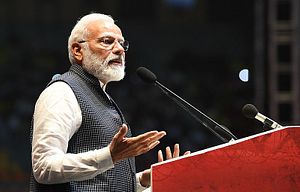Editor’s Note: The following is a preview of the latest edition of the APAC Risk Newsletter, presented by Diplomat Risk Intelligence. To read the full newsletter, click here to subscribe for free.
This week, Indian Prime Minister Narendra Modi delivered a national address (full text here) that, among other things, was meant to provide a sense of relief to the country’s 1.3 billion people about how the government was managing COVID-19’s economic and health effects. Many analysts had anticipated that some sort of direct economic relief would be announced and they weren’t disappointed. Modi unveiled a $266 billion package, amounting to around 10 percent of Indian GDP—one of the largest stimulus packages to date by any country, certainly an emerging economy like India, in response to the effects of COVID-19.
The stimulus package was clear enough: It came with a price tag and Modi clarified some of the ends to which it would go. Along with the Reserve Bank of India’s moves to date and earlier relief in March, the Indian government is not holding back on big spending. The country’s COVID-19 response, however, has continued to face criticism for its inadequacies, particularly insofar as the poor and migrant workers are concerned. Tens of millions continue to find themselves untethered from opportunities for income, raising the stakes considerably day-to-day. Indian businesses, too, have taken a major hit across the board as the lockdown’s effect on demand has reverberated over the last nearly two months.
Returning to the economic package, however, Modi unveiled it with a somewhat puzzling message: “This package will work to bring about a self-reliant India,” the Indian prime minister said. Self-reliance is an old idea in India—and, indeed, one of the most prominent political principles in many post-colonial polities. What was it doing in the Indian government’s messaging over its COVID-19 relief measures?
Nirmala Sitharaman, India’s minister of finance, followed up on Modi’s announcement with a few more details, including on how small businesses would be able to leverage new sources of relief without collateral through the end of October. But the “self-reliance” component of the messaging remains somewhat of a mystery. The term’s centrality in the government’s messaging has left more than a few analysts wondering if India might lurch backward toward the Cold War-era days of import substitution policies and embracing a more insular economic mindset. Some of these worries are founded on India’s continued aversion to rapid trade integration in Asia, as encapsulated by Delhi’s reticence on signing up to agreements like the Regional Comprehensive Economic Partnership (RCEP).
It’s possible that “self-reliance” is simply poor branding for what is otherwise meant to be a message about India’s economic resilience (as Tanvi Madan suggests).
Elsewhere, New Delhi’s behavior so far in this pandemic points to opportunity-seeking behavior, such as by reaching out to foreign manufacturers that might be seeking to diversify risk away from China by creating incentives to set up shop in India. Much of this is consistent with initiatives going back to the pre-pandemic era and Modi’s first term in office, such as the “Make in India” push to increase India’s manufacturing capacity. (“Make in India” largely failed to take off in the way originally envisioned, with manufacturing as a share of Indian GDP actually having declined since Modi became prime minister back in 2014.
For now, it’ll be prudent to wait and see how the Indian government puts its intentions into practice. Wait for the policy implementation.
To read the entirety of the latest edition of the APAC Risk Newsletter, presented by Diplomat Risk Intelligence, click here to read and subscribe for free.

































